On April 29, 2019 my attorney Dan Hardway filed a petition for certiorari asking the Supreme Court to review my case, Morley v. CIA.
When I filed this Freedom of Information Act (FOIA) lawsuit 16 years ago, I sought certain files related to the assassination of President John F. Kennedy in 1963. The JFK story still resonates, albeit more faintly than it once did. Kennedy was a popular liberal president who, at the time of his death, was challenging the country to embrace civil rights and “a strategy for peace” to end the Cold War. Detested in the Pentagon and CIA as a weakling and traitor, Kennedy was shot dead as his open-air motorcade passed through downtown Dallas on a sunny day in November 1963.
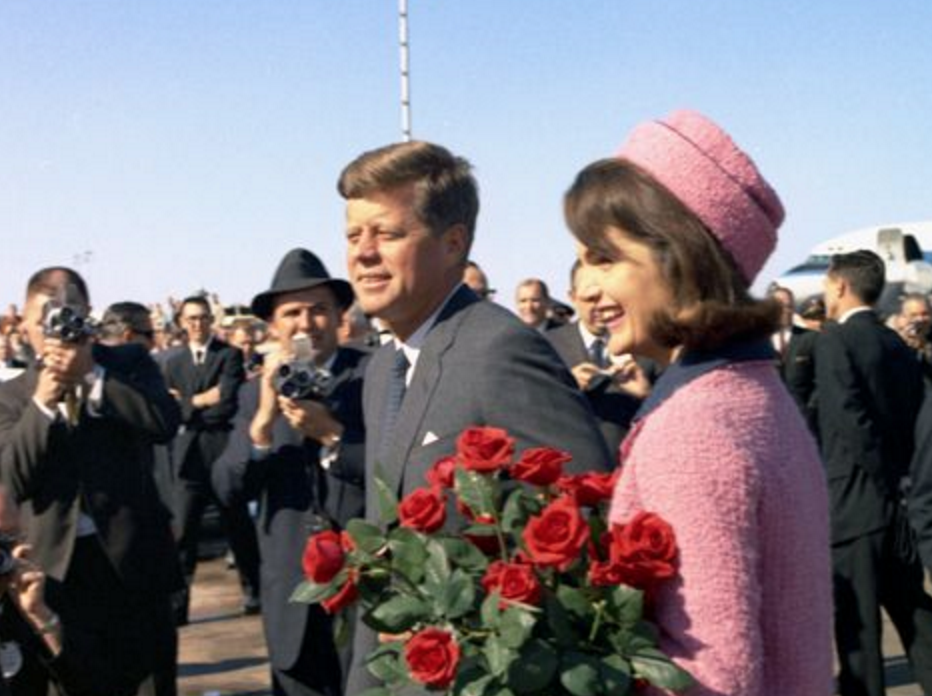
I never expected the case would take so long or rise so high. Yet I am not surprised. I always believed FOIA litigation could shed new light on the causes of JFK’s assassination, a national trauma on par with 9/11 for the next generation. I anticipated new information would clarify long-standing questions about America’s most enduring murder mystery. And I expected the CIA would resist full disclosure. The federal courts have been divided on the merits of my case, leaving the Supreme Court as the final arbiter.
[This article was first published as “JFK Records Suit Tests CIA Secrecy on Assassination” by Jefferson Morley, on April 29, 2019 on the Just Security blog.]
My lawsuit, filed in December 2003, sought records to clarify the CIA’s response to JFK’s murder. After Kennedy was killed, the Dallas police department immediately picked up an ex-Marine named Lee Harvey Oswald and claimed he shot the president. Oswald denied the charge and was killed in police custody the next day. A year later, a commission of Washington insiders concluded Oswald acted “alone and unaided.” JFK’s death was not politically motivated, it was proclaimed.
As the biographer of two top CIA operations officers who were deeply knowledgeable about the events of 1963, I don’t find the official story of a “lone gunman” to be credible. The CIA men I wrote about did not believe it, not in the privacy of their thoughts and actions. They knew far more about Oswald, the supposed assassin, before JFK was killed than they disclosed to investigators. Declassified records and interviews demonstrate that the agency settled on the story of a “lone gunman” in order to conceal its deep pre-assassination interest in Oswald from law enforcement, Congress, and the American people[.
With the help of Jim Lesar, a veteran FOIA litigator, I sought to learn more via a request for information about a Miami-based CIA operative named George Joannides who handled sensitive matters for senior officials in Langley. The request turned into a long-running lawsuit. Thanks to a unanimous December 2007 appellate court decision, issued over strenuous CIA objections, I obtained more than a thousand pages of material.
‘Presumed Assassins’
The redacted Joannides files illuminated two previously unknown aspects of the JFK story.
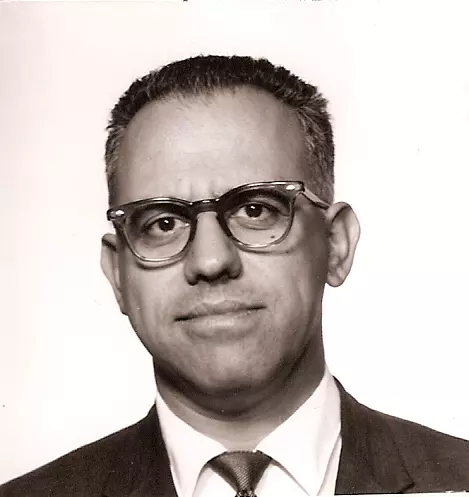
The first was Joannides’ role in an authorized and deniable CIA psychological warfare operation that generated propaganda about Oswald. A job evaluation from 1963 revealed Joannides ran a CIA-funded anti-Castro student group, the Cuban Student Directorate, known by the code name AMSPELL. Within 48 hours of Kennedy’s death, Joannides’ agents published the first JFK conspiracy theory, claiming Oswald and Cuban leader Fidel Castro, were “the presumed assassins.”
The second story revealed by my lawsuit was Joannides’ obstruction of a congressional investigation. In 1978, after the Watergate-era revelations about CIA abuses, Congress re-opened the JFK probe by creating the House Select Committee on Assassination. The agency called Joannides out of retirement to serve as liaison with the Committee investigators. He shut down their inquiries. Even under direct questioning, he did not disclose the Oswald-AMSPELL activity. A 1979 job evaluation praised Joannides as “the perfect man” for dealing with the Committee. In 1981 he received the agency’s Career Intelligence Medal for “exceptional achievement.”
Intrigued, I sought to obtain another 330 records about Joannides that the agency withheld on grounds of “national security.” In June 2010, the U.S. Court of Appeals rejected my arguments and said the CIA had complied with the FOIA. The substantive part of the case was over.
I then asked the court to order the government to pay for cost of my litigation, namely Lesar’s fee for hundreds of hours of time he spent crafting the arguments that freed the Joannides files. Under the FOIA, the government is required to pay court costs if the plaintiff has “substantially prevailed.”
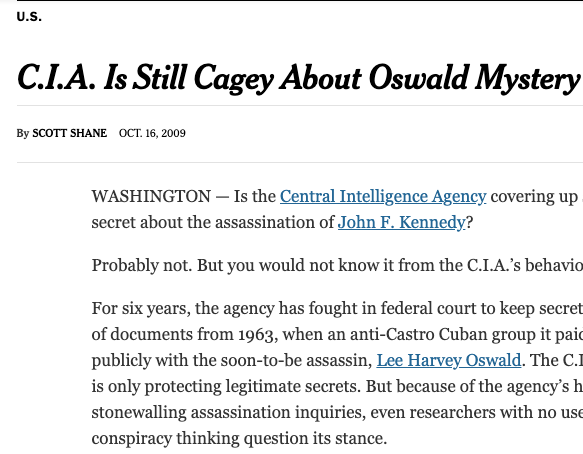
The law is designed to incentivize the government to follow the FOIA and to compensate citizens, reporters, and whistleblowers who seek information in the public interest. One of the four factors in awarding legal fees is whether the information sought has the potential to benefit the public.
I thought I cleared that bar easily. The New York Times, Fox News, Associated Press, Politico, and USA Today covered Morley v. CIA. The Washington Post and two dozen other mainstream news sites published the AP story. The Times and other sites published a photo, obtained via FOIA, which showed Joannides receiving his medal.
In December 2011 District Court Judge Richard Leon dismissed my request for legal fees, asserting the litigation had uncovered little of substance. I appealed. In June 2013 the Court of Appeals reversed Leon’s decision. In July 2014, Leon threw out my case on different grounds. In January 2016, the appellate court reversed him again.
Throughout this legal slog, the CIA and Justice Department’s lawyers have insisted there is no public benefit to the disclosure of Joannides’ JFK-related activities. Move along, says the CIA. There’s nothing to be learned in the Oswald-AMSPELL story or in the ancient Joannides files that contain sensitive valuable “national security” secrets.
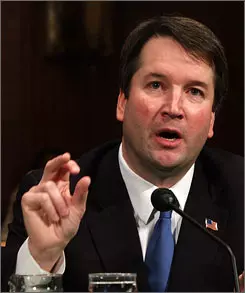
Last July, on a fourth hearing, a divided three-judge panel dismissed my case. Now-Justice Brett Kavanaugh, in his last decision before he joined the high court, assessed the value of my FOIA lawsuit as “small.”
Judge Karen Henderson, the senior judge on the D.C. Court of Appeals, issued a stout dissent, saying I clearly deserved to have my court costs paid. Kavanaugh’s decision, she declared, “ignored our precedent and misapplied our mandate.”
Findings
What has Morley v. CIA revealed about JFK’s assassination?
For 16 years, I resisted definitive conclusions about Joannides’ role in the events that led to JFK’s death. I truly wasn’t sure. I wanted to see all of the CIA’s records on the subject first.
I awaited the promise of the JFK Records Act of 1992: full disclosure. The law, passed unanimously by Congress, mandated the release of all of the government’s JFK files within 25 years, that is to say, by 2017. The promise, alas, was betrayed by President Trump. He used the one loophole provided in the law, allowing for continued postponement of release of assassination records. Trump, the conspiracy theorist, certified that disclosure would cause “an identifiable harm to the military defense, intelligence operations, law enforcement, or conduct of foreign relations” and that “the identifiable harm is of such gravity that it outweighs the public interest in disclosure.”
In his October 2017 White House directive, Trump stated he had “no choice” (curious phrase) but to allow federal agencies to continue to withhold thousands of JFK assassination files from public view– including the Joannides files. In April 2018, the National Archives reported that 15,834 assassination records remain redacted, most of them by CIA and FBI. These files will remain sealed until April 2021 at the earliest,
‘No-Brainer’ on Secret JFK Files
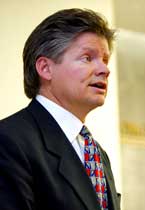
The continuing secrecy around thousands of JFK files surprises Judge John Tunheim, former chair of the Assassination Records Review Board (ARRB). The ARRB was a civilian review board that declassified hundreds of thousands of JFK files in the mid-1990s.
“My assumption was that all the remaining records would simply be released in 2017,” Tunheim, now the senior federal judge in Minnesota, told me in an interview. “At that point in time [1998], our thinking was there is no legitimate reason to withhold information about how we collected information fifty years ago, that there would be no legitimate reason for protecting things that were that old.”
The agency’s stance on the Joannides files is particularly obtuse, Tunheim said. In 1998, the JFK review board asked the agency to provide relevant Joannides files. The agency handed over exactly 11 pages of material. The CIA “fooled’ the board about the extent of the Joannides files, Tunheim said. “We would release them in full today without a moment’s hesitation,” he said. “It’s a no-brainer.”
Of course, the fact that the CIA is sitting on thousands of JFK files in 2019 does not necessarily mean the U.S. government is hiding evidence of a conspiracy in 1963. As President Obama said in a 2009 memorandum, “the problem of overclassification” is endemic in the federal government. I’m pretty sure that 95 percent of the still-secret JFK files are historically irrelevant. It’s the remaining five percent, however, that interests historians, researchers, journalists and students.
The files I sought in my lawsuit are a case in point. They do not contain evidence that Joannides plotted against JFK’s life. They contain plenty of evidence that he abetted those who did, after Kennedy was dead. He wasn’t in Dallas when JFK was killed. He helped run the coverup in Miami and Langley afterwards. He died in March 1990.
‘We Were Used’
I did not take my case to the Supreme Court to vindicate any conspiratorial interpretation of JFK’s death. I pursued new information to fill out the fact pattern around the assassination with confidence that people can make up their own minds about what it shows.
My reading of the evidence conforms with that of knowledgeable observers. Attorney General Robert Kennedy concluded his brother was ambushed by enemies in his own government. So did the widowed First Lady, Jackie Kennedy.
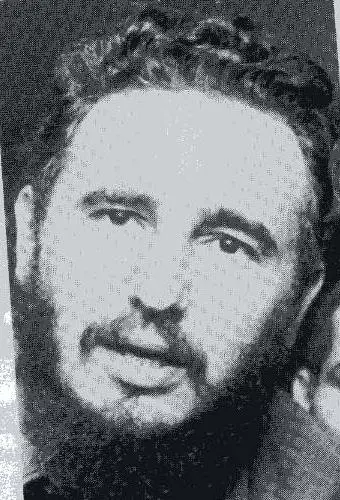
Two astute contemporaries, Fidel Castro and Charles DeGaulle, also believed that Kennedy fell victim to a conspiracy emanating from within U.S. security forces. Castro was a battle-hardened Marxist revolutionary. DeGaulle was a continental conservative snob. They knew, as well as anyone, the workings of American power and the machinations of the CIA. More recently, Rolf Mowatt-Larssen, a retired CIA station chief and Just Security editor, told a conclave of retired spies that he believes if the CIA were responsible for JFK’s murder, it was likely certain rogue CIA officers in Miami.
Morley v. CIA produced documentary evidence consistent with the Castro-DeGaulle-Mowatt-Larssen interpretation of November 22, 1963. The Joannides’ files laid bare agency operation around Oswald. Joannides’ propaganda agents among anti-Castro Cuban students created a plausible public record—in intelligence parlance, a “legend”—that Oswald was a leader of a pro-Castro group called Fair Play for Cuba Committee (FPCC) in New Orleans. The FPCC was a popular socialist organization with 30 chapters on college campuses that defended Castro’s revolution, which had abolished racial segregation and redistributed land to poor people.
The CIA operation that monitored and manipulated Oswald emerged from a joint CIA-FBI program known as COINTELPRO. Short for Counterintelligence Program, COINTELPRO sought to undermine and destroy civil rights and antiwar organizations from 1958 to 1974. According to this declassified memo, the CIA was conducting a secret operation against the FPCC as of mid-September 1963.
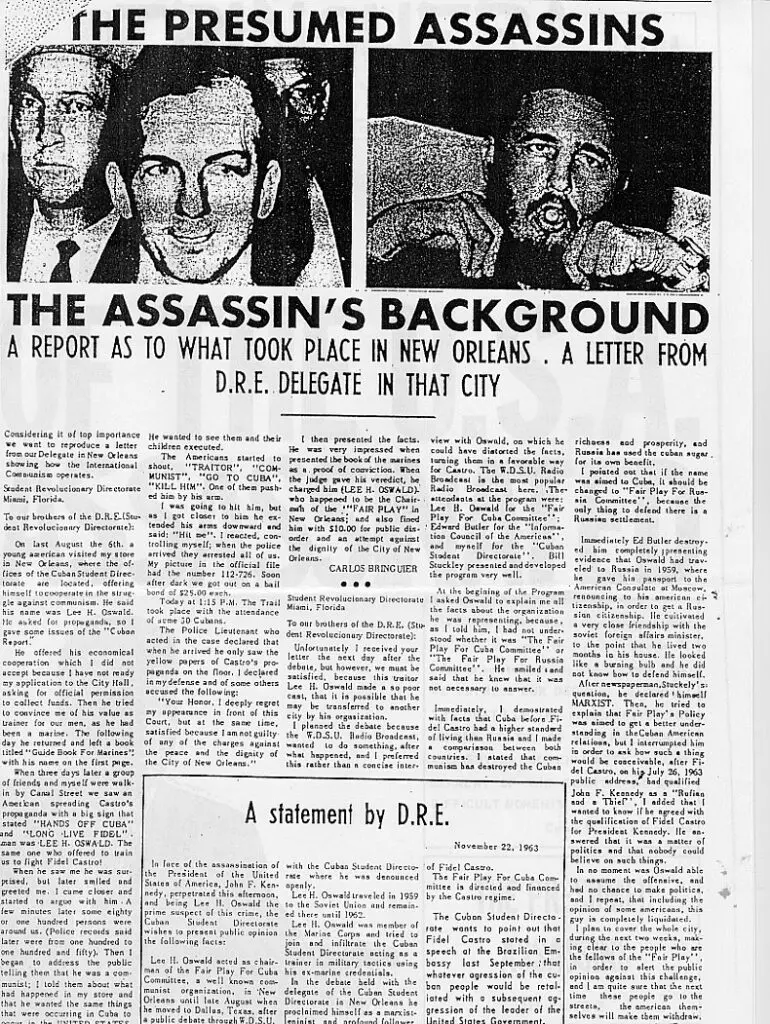
Joannides was involved. Within hours of Oswald’s arrest, his AMSPELL agents in the Cuban Student Directorate fed reporters the story that the president had been killed by a leader of the FPCC.
One of those AMSPELL agents was Jose Antonio Lanuza. A retired school teacher in Miami, Lanuza served as spokesman for the CIA-funded Cuban Student Directorate in 1963. According to a JFK Library memo, the Cuban students received $51,000 a month from the CIA.
On the night of November 22, 1963 Lanuza recalls the group communicated with the group’s CIA handler, Joannides, whom he knew as “Howard.” Lanuza also recalls speaking with a dozen local and national reporters about the connection of Kennedy’s accused killer to the pro-Castro FPCC. The next day, the AMSPELL information fueled headlines that the American president had been killed by a “pro-Castro assassin.”
“We were used by the people who wanted to make Oswald take all the blame for killing Kennedy,” Lanuza said in an interview. “We were ideal cover for using the theme of Oswald being a Castro supporter. Somebody wanted to build up that story. That’s where we came in.”
The first-day AMPSELL publicity blitz did much to convince the public that a liberal president had been killed by a communist.
But was it true? Under interrogation, Oswald denied shooting Kennedy. He told reporters that he was a “patsy.” The next day he was shot dead in police custody by a Dallas nightclub owner with organized crime connections. These shocking and baffling events gave birth to a thousand conspiracy theories.
I took my case to the Supreme Court to bypass the theories and get the facts: to complete the historical record of a critical moment in which American democratic institutions were attacked, a record that the American people do not yet fully possess.
CIA Medal
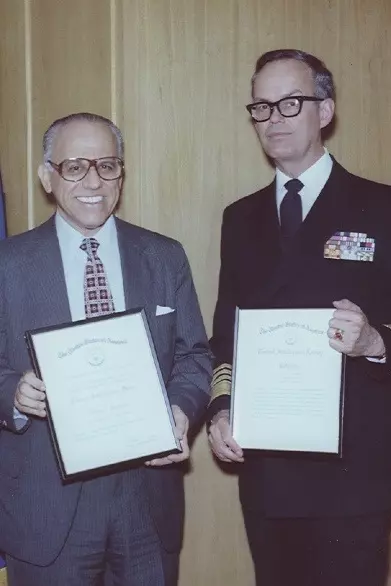
Perhaps the biggest single revelation generated by Morley v. CIA was the medal given to Joannides. Inside the agency, one might say that Joannides protected the agency’s “sources and methods” around the Oswald/AMSPELL/FPCC operation. Outside the agency, you could say he was honored, at least in part, for perpetuating the JFK cover-up.
House Select Committee on Assassination general counsel G. Robert Blakey, now emeritus professor at Notre Dame law school, told PBS Frontline that Joannides had obstructed Congress’ investigation, a felony. Was he concealing the existence of a CIA operation to falsely blame Oswald for killing JFK? Or just CIA incompetence? Absent full disclosure, definitive conclusions are elusive.
Morley v. CIA fell short of getting the whole story. The agency identified but never released 330 Joannides files I sought. These include 44 documents from 1963 and 1978, which concern Joannides’ cover and “intelligence methods.” They are key to the JFK story. I suspect they identify the senior agency officers who authorized psychological warfare operations that linked Oswald to Castro’s Cuba before and after JFK was killed.
According to the agency, not a single word contained in these antique records can be made public in 2019 without threatening “national security.” Given that most of the records in question are more than 50 years old, the claim seems far-fetched, if not suspicious. Nonetheless, the federal courts agree it is accurate.
‘Entirely Unreasonable’
When I first requested records on Joannides in 2003 the CIA referred me to the National Archives, asserting that all the Joannides records I sought were held there. Not only was this statement factually wrong, the agency disregarded the Supreme Court’s 1989 Tax Analysts decision, by foisting me off on another federal agency. Three appellate court panels agreed that the case had been improperly decided, until Kavanaugh affirmed the CIA’s actions had followed the law.
The question now before the Supreme Court is not conspiracy. The issue is accountability and how the FOIA seeks to insure it. In the July 2018 majority opinion, Kavanaugh ruled the CIA acted “reasonably” in spurning my JFK queries. Judge Henderson countered that the government’s actions were “entirely unreasonable” and I should be awarded court costs.
The high court now has the opportunity to decide. The answers are a long time coming.

